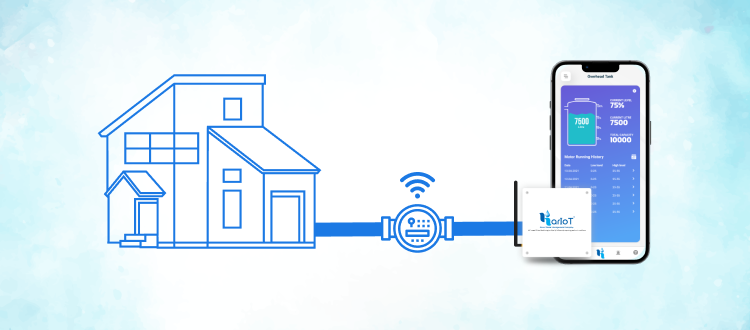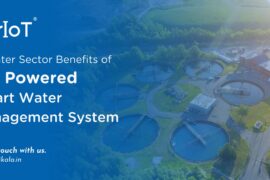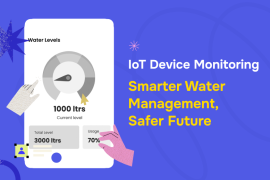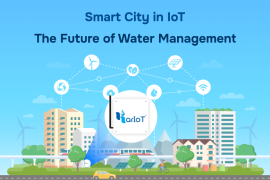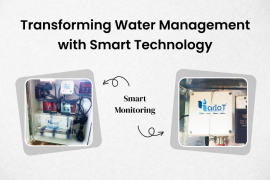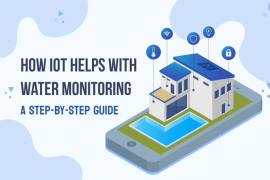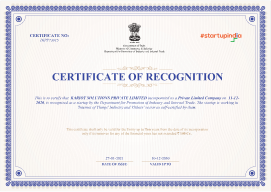Water is the most essential for our survival. In another few years, there will be water scarcity all over the world. To overcome water scarcity, we have to adopt the practices and guidelines of Smart water management systems. In this current era, most organizations are taking steps to monitor and control water consumption. During the traditional days, we were relying on a few methodologies and procedures that foster water consumption. These customary techniques were implemented in multiple projects.
Recently, IoT-enabled Smart water management system has taken over the control of water management functions buoyantly. Important factors like continual water supply is essential to execute this gigantic technology in the network. Most companies have started to adopt the IoT-enabled smart water management system. These optimal solutions are focusing on ingenious approaches to handle multiple challenges in this prodigious industry. Most companies have started to develop ideal & scalable solutions integrated with IoT technology.
Statistical data
The worldwide Smart Water Management trade has reached nearly fourteen billion dollars. It is expected the revenue will reach nearly twenty-three billion dollars by 2026. The Smart Water Management System delivers well-defined methodologies to preserve water resources and monitor the usage of water in industrial units. With the aid of a scalable IoT-enabled smart water management solution, it is feasible to find out the leakage spots in real time.
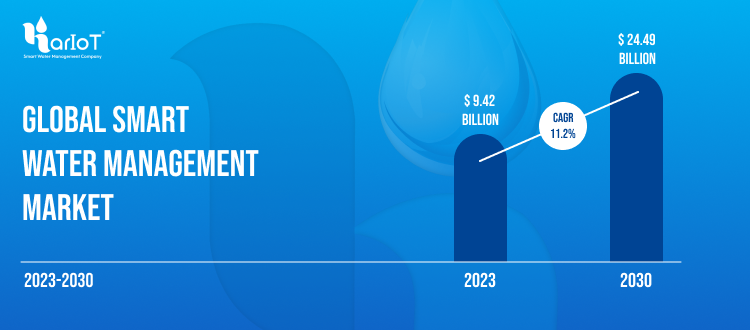
An overview of IoT-Based Smart Water Management System
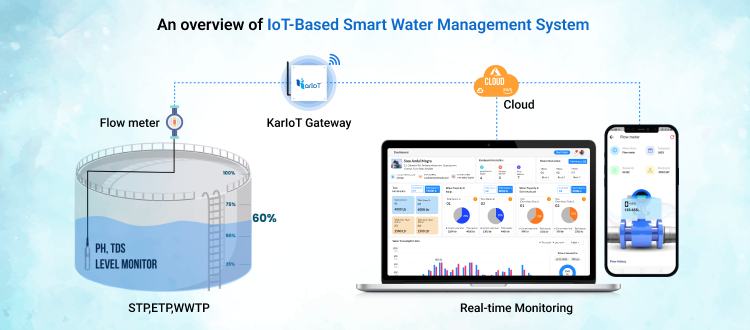
Generally, IoT technology endorses multiple water industries delivering power-packed smart water management robust solutions to conserve water resources. To date, most water industrial units are implementing SCADA systems to regulate water distribution impeccably. Within the boundaries, SCADA is installed in the industrial treatment plants. On the other side of the flip, the progressive IoT-enabled solutions can afford optimized smart water management systems by inducting IoT sensors at several points areas.
These sensors aid in the real-time monitoring of water consumption or leakages. The IoT sensors, flow meters, smart water meters, and IoT-enabled water valves examine the pressure level, temperature, and flow. These collective data help the firm to predict in-depth analysis and conduct real-time changes subjective to the water resources. The IoT-enabled smart water management system eradicates the functional cost, and maintenance charges & enhances profit.
Recently, IoT has established power-packed mechanisms that allow the water management system to automate various functions. The IoT sensors, flow meters, smart water meters, and IoT valves assist the water industries to maintain real-time pressure, temperature, level, flow, etc. This system allows firms to forecast water absorption in the forthcoming days. On the other side of the flip, one can take well-defined decisions on controlling water changes and process changes in the exploitation of water resources. By using this reliable system, one can reduce the price incorporated with functionalities, subsistence, erection, etc.
Want to know more?
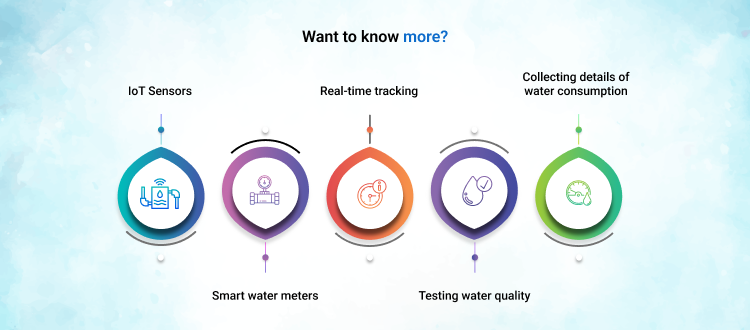
IoT Sensors
Generally, IoT sensors depict alleviation in monitoring different water levels. The main function of sensors is to transmit data to the cloud on a regular period. It delivers the calculation of the level of water consumed on a routine basis. By using the IoT-enabled smart water management; you can examine the level of water in the tank.
Smart water meters
The smart meters allow the specialists to monitor real-time consumption of water and it is feasible to measure the exact usage of water and its wastage too. It aids in spot apt water consumption patterns. This also helps to predict the consumption level in the future. By making use of reliable trends and techniques, it is impeccable to maintain every process in order. The water industrial owners can use smart water meters to control water flow and its consumption degree. By using real-time monitoring systems and smart meters, one can optimize water habitual consumption and attain the integrality target.
Real-time tracking
Smart water management using IoT provides a scalable solution for testing the quality of water. The IoT sensors are integrated with the water pipelines. It helps to monitor water temperature efficiently. If there is any leakage, it can also be easily detected. Apart from the water leakage, the IoT sensors examine the chemical leakage too. There are various challenges in the detection of leakages, and testing water quality and its flow in the different units. The optimal solution helps to estimate the amount of residue present in the water.
Testing water quality
Most industries like manufacturing, STP, ETP, and chemical units test the water quality. The IoT technology brings out the pH sensors & water testing meters to check their quality level. As a result, a list of factors like chlorine, bacteria, and its TDS & more can be determined easily.
Collecting details of water consumption
Ideally, a Smart water consumption board system monitors the absorption level of water in a concerned location. Nowadays, it is possible to track water consumption in urban areas. Along with this standard system, the authorities can examine the data in a detailed manner.
Working IoT-enabled Smart Water Management System
The IoT-enabled Smart Water Management System assists firms to control water source points by uniting smart meters and sensors. It assembles the data and produces a detailed report of water performance. With the aid of dashboards, industries can analyze water consumption from any location and at any time. At the same time, it aids in the detection of serious issues like blockages or leakages in the pipeline system.
An array of IoT functionalities to enhance the water management system
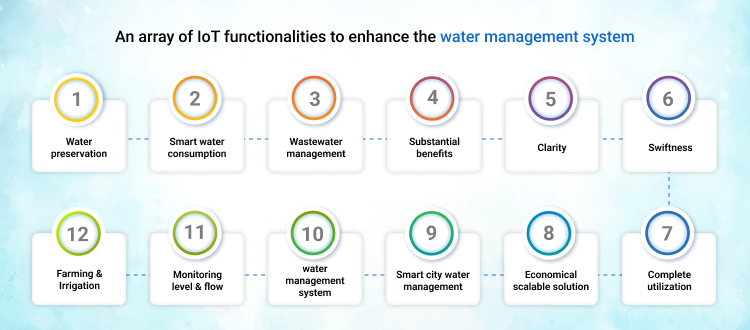
Water preservation
The main role of IoT sensors is to monitor the water level in the tanks. The overall process takes place in a unique manner. Where data will be sent to the cloud in a habitual period to estimate. The water consumption on a routine basis that aids in the preservation of water.
Smart water consumption
Preserving water in urban locations is a huge challenge for water control & board systems. Contemporary IoT technology simplifies the overall process and maintains the details of water consumption by examining data impeccably.
Wastewater management
The main contradiction in water management is tracking water level, blockage, and leakage, testing water quality, and checking its flow through different channels. The IoT sensors are integrated at the different points of pipelines that can spot the temperature, flow of water leakage, chemical residue detection, etc. It sends instant notifications to the concerned authorities by sending data to the cloud system and sorting out the issues rapidly. Another advantage of IoT enabled smart water management systems is to estimate the chemical substances present in the water.
Substantial benefits
Generally, Smart water management is highly responsible for all your needs and can make a multitude of differences. One of the impressive benefits of IoT technology is to maintain top-notch water quality. The smart sensors can process functional enhancements in the pipeline systems. The IoT technology delivers a robust solution to help entrepreneurs, and households maintain their competency level.
The main focus of IoT-enabled smart water management systems is to build an efficient process. The major players in water storage networks are top-notch frameworks, treatment plants, etc. The IoT innovation should be applied over inventory networks, well-defined communication, informative apps, etc. In this section, you can gain details about the benefits of the Smart Water Management system.
Clarity
In this era, most authorities are adopting IoT trends & techniques. It mainly works on the multiple cycles in the enormous water network. Initially, information will be accumulated through the water networking system. The executives can gain relevant experience with framework implementation.
Swiftness
The next advantage of building a smart water board system is to overcome the challenges and eradicate the risk factor. The continual examination of water quality allows an individual to spot the differences including the issues. It delivers in rapid reaction before possessions are out of control.
Complete utilization
The water board systems enable the admin to operate a list of cycles and increase the exploitation of resources. It is essential to consider the factors like work location, business requirements, and goals. The smart water supply system can automate the overall process by integrating IoT meters, a well-defined framework, and intended estimation models.
Economical scalable solution
Lists of elements like automation, real-time monitoring, and well-defined decisions upgrade the efficiency of managing projects. It automatically leads to the utilization of resources and better maintenance. The IoT technology permits water companies to empower IoT systems.
Smart city water management
In a normal routine, the city admins monitor the supply of water, pipeline systems, and their consumption. By adopting IoT technology, it is easier to monitor the water supply chain. The sensors help to accumulate real-time data that aid in the tracking of water distribution. The residential areas and the industries that have bought smart meters can enjoy the benefits of a dynamic billing system, pay-per-usage, real-time monitoring, etc.
The interrupted water supply chain can completely deplete the budget. Apart from the monitoring of water consumption, IoT technology aids in the detection of issues like blockage, leakages, etc. These issues will be sent to the respective authorities in the form of instant push notifications.
Top-notch quality water management system
Examining the water quality is the most crucial one. The contaminants in the water resources like rivers, and lakes are hazardous to every human. Day by day the population is increasing which has reduced water quality. In our gigantic globe, IoT assists in the real-time distribution of water and follows regulatory guidelines. The water quality management network tackles the issues impeccably. In case there is no evolution of IoT technology, then everything will be processed manually.
The entire process is a little bit expensive and occupies more time. On the other side of the flip, IoT sensors measure temperature, quality, obscurity, etc. The authorities receive the data and permit them to test the water quality from remote locations.
Monitoring level & flow of water in dams
Generally, dams play a vital role in the livestock and irrigation systems. In the conventional methods, there are more challenges that are time consuming and also complicated. By introducing the water level monitoring system integrated with the IoT technology, it is feasible to measure the pressure & vibration. On the other side of the flip, one can examine the leakage in the pipeline systems. The alert messages will be sent to the smart gadgets in just a few seconds. In crucial weather conditions, there will be control over the gate systems.
Smart water management for farming & Irrigation
For the past few years, the population has increased due to a huge extent. The increase in the population count means that we need more food. Food consumption has also been altered. It automatically led to enhanced worldwide crop production that needs more levels of water consumption. In the future, we will face water scarcity due to multiple reasons. The IoT technology helps to manage the water efficiently. Also we can easily overcome the challenges of water scarcity. This gigantic system for agriculture can enhance farming and monitors different factors like temperature, soil moisture, humidity, etc.

End note!!
From this blog, you have understood that the craze for IoT-enabled smart water management systems is skyrocketing for apt reasons. Nowadays, technology is adopting projects with automation to attain efficiency. By implementing IoT, it has been made easier from the process of testing water quality to analysing the data. Overall, both augmentation and automation provide a way for expenditure savings. Hence, the most firms started to move in the direction of IoT implementation services to develop scalable and ideal systems.
Are you planning to build an IoT solution to develop your business? First, you have to recruit IoT developers who will help you to automate your business functional units with contemporary trends & techniques. It is essential to review your plan and process research from the scratch. While looking for IoT exceptional services. First confirm that your requirements are clear and customized too. KarIoT will help you to attain your goal in business and earn more revenue in a shorter period.

